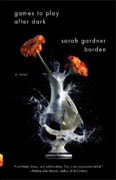Games to Play After Dark
Sarah Gardner Borden
book reviews:
· general fiction
· chick lit/romance
· sci-fi/fantasy
· graphic novels
· nonfiction
· audio books
· author interviews
· children's books @
curledupkids.com
· DVD reviews @
curledupdvd.com
newsletter
win books
buy online
links
home
for authors
& publishers
for reviewers

 |
Games to Play After Dark Sarah Gardner Borden Vintage Paperback 336 pages May 2011 |
|
This novel is a paean to the internal struggles of contemporary women, the wives and mothers born of feminism, pro and con, neither the Steinems nor the Friedans any longer vigorously “manning” the trenches as women continue to grapple with the dichotomies they face between career and family.
Kate carries the consequences of that conflict like a bruise on her psyche, an unsightly port-wine stain that festers through the years of her marriage, defines her reaction to society’s expectationsm and a husband oblivious to his wife’s struggle with her role as mother and wife. In the blush of attraction, marriage to Colin seems a positive choice reinforced by the blossoming of sexual experimentation and Kate’s penchant for aggressive lovemaking, which Colin is happy to oblige. It is later in the marriage, when Kate realizes she not only has a husband and two daughters but a “household” that the shimmering resentments break the surface and find voice. Colin is befuddled, irritated, unable to comprehend or sympathize with Kate’s chronic discontent with her lot in life. But that long-ago, sublimated combat with her father is leaking from its sealed compartment, slowly poisoning Kate’s carefully constructed life, inspiring behavior that terrifies an exhausted young mother who has sacrificed her independence to the needs of her family. Here is the blazing truth of this novel: growing up female is not for sissies. Even the level of affluence that allows the hiring of nannies and shopping at Whole Foods cannot ameliorate the burdens of a society weighted in favor of the male population. That tentative balance between the sexes has yet to be found, let alone acknowledged, a third-rail that is breached in laugh-track sitcoms and acerbic standup comic routines but is as pervasive as weight gain and gray hair. Kate’s inevitable contretemps with Colin is ahead of the curve, likely propelled by the contentious relationship with her father but certainly exacerbated by Colin’s reactions to her demands for validation. Discontent and its twin, argument, roll in like a freight train, the result a disturbing reckoning between husband and wife. Neither combative nor brutal, the author proves the power of honest storytelling in this haunting novel. Few contemporary women will fail to recognize Kate and the wounds she bears, a brave warrior seeking a broader perspective of choices for her daughters in a marriage no better or worse than most. While Colin may pay the price as collateral damage of the past, the collision is inevitable, unrelated to sexuality but very much about sex, the euphemisms of Venus and Mars pale distractions and hardly worthy of consideration. Sarah Gardner Borden delivers a knockout punch that leaves her audience stunned and breathless. Originally published on Curled Up With A Good Book at www.curledup.com. © Luan Gaines, 2011 |
|
|
|
 Click here to learn more about this month's sponsor! |
|
| fiction · sf/f · comic books · nonfiction · audio newsletter · free book contest · buy books online review index · links · · authors & publishers reviewers |
|
| site by ELBO Computing Resources, Inc. | |
 Kate is the daughter of a New York professor, a brilliant man vaguely humiliated that his firstborn is a female. Father and daughter rally to create a bond that is summarily and painfully sundered by the arrival of menstruation. The ugly reality of her sexual maturation strains their pristine camaraderie, Professor Allison appalled and uncomfortable with what he is helpless to control. Their relationship takes a decidedly dark turn with Kate’s rebellion and blatant exercise of her sexuality, her father unable to hide his reaction or control his rage at his daughter’s behavior.
Kate is the daughter of a New York professor, a brilliant man vaguely humiliated that his firstborn is a female. Father and daughter rally to create a bond that is summarily and painfully sundered by the arrival of menstruation. The ugly reality of her sexual maturation strains their pristine camaraderie, Professor Allison appalled and uncomfortable with what he is helpless to control. Their relationship takes a decidedly dark turn with Kate’s rebellion and blatant exercise of her sexuality, her father unable to hide his reaction or control his rage at his daughter’s behavior.